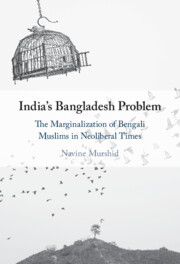Book contents
- India’s Bangladesh Problem
- India’s Bangladesh Problem
- Copyright page
- Dedication
- Contents
- Figures
- Tables
- Acknowledgments
- Introduction
- 1 Neoliberalism and Identity-Based Hierarchy
- 2 Borders as Sites of Strength and Vulnerability
- 3 Assam and the “Illegal” Other
- 4 Whatever Happened to Bengali Nationalism? The “Appeased” Muslims of West Bengal
- Conclusion
- Select Bibliography
- Appendices
- Notes
- Index
3 - Assam and the “Illegal” Other
Published online by Cambridge University Press: 30 March 2023
- India’s Bangladesh Problem
- India’s Bangladesh Problem
- Copyright page
- Dedication
- Contents
- Figures
- Tables
- Acknowledgments
- Introduction
- 1 Neoliberalism and Identity-Based Hierarchy
- 2 Borders as Sites of Strength and Vulnerability
- 3 Assam and the “Illegal” Other
- 4 Whatever Happened to Bengali Nationalism? The “Appeased” Muslims of West Bengal
- Conclusion
- Select Bibliography
- Appendices
- Notes
- Index
Summary
Chapter 3 analyzes how economic decay and aspirational neoliberalism justify anti-Bangladeshi xenophobia in Assam. This xenophobia relies on the view that East Bengalis have historically – at least since colonial times – been a source of "economic threat," real or imagined. The segregation of Bengali Muslims in Lower Assam sustains the perception of their outsider, even illegal, status, maintaining this view of the economic threat. While Assam’s desire for national self-determination characterized its relationship with mainland India in the initial decades since (Indian) independence, in recent years fractious politics and separatist movements found resolution in anti-Bangladeshi sentiments, as it served as the common cause that would unite the various ideologically opposed sections of society. The most recent example of this is the mobilization surrounding khilonjiya or indigenous interests in the context of population registration (NRC) and the controversial Citizenship Amendment Act (2019). They underscore how anti-establishment claims fit alongside nationalist ideas of strict border control and the expulsion of those deemed foreign, i.e., Bangladeshi. In effect, anti-Bangladeshi sentiments become the glue that holds together the Indian nation state.
- Type
- Chapter
- Information
- India's Bangladesh ProblemThe Marginalization of Bengali Muslims in Neoliberal Times, pp. 103 - 143Publisher: Cambridge University PressPrint publication year: 2023



